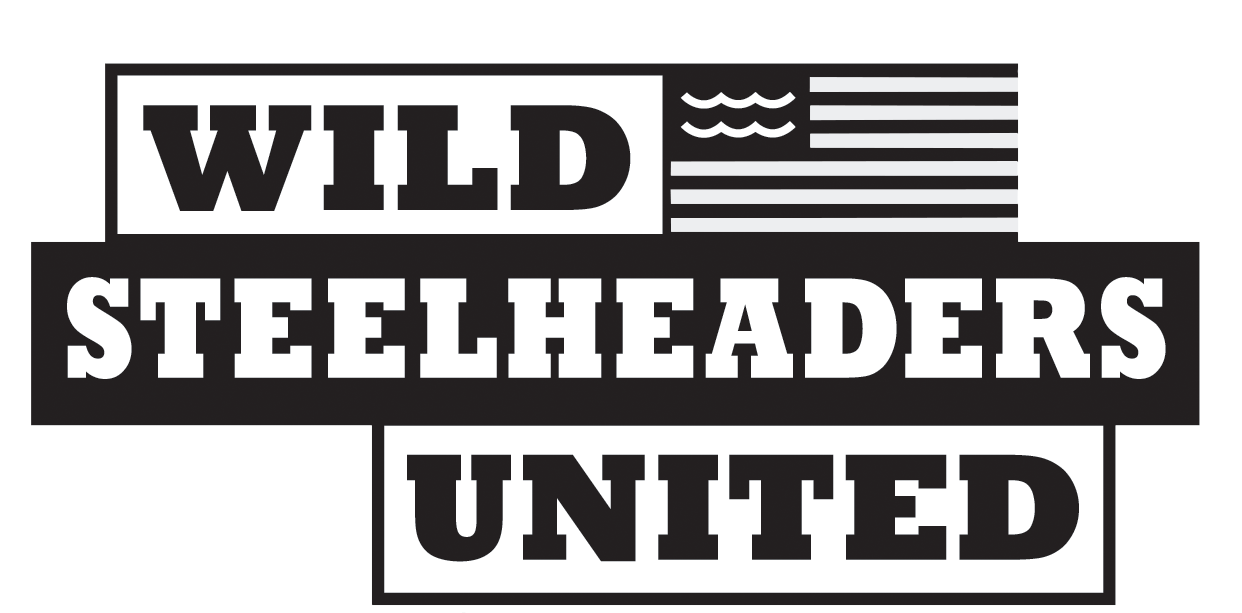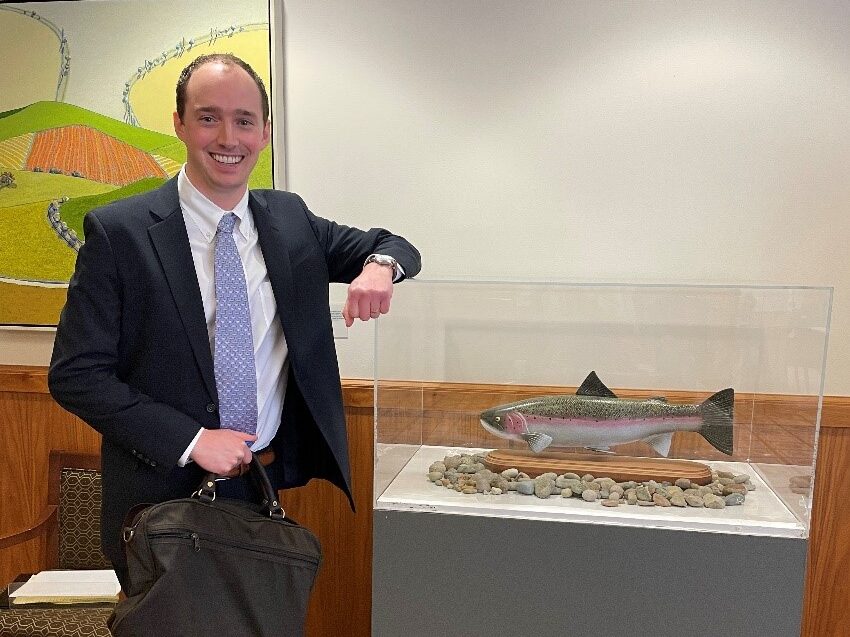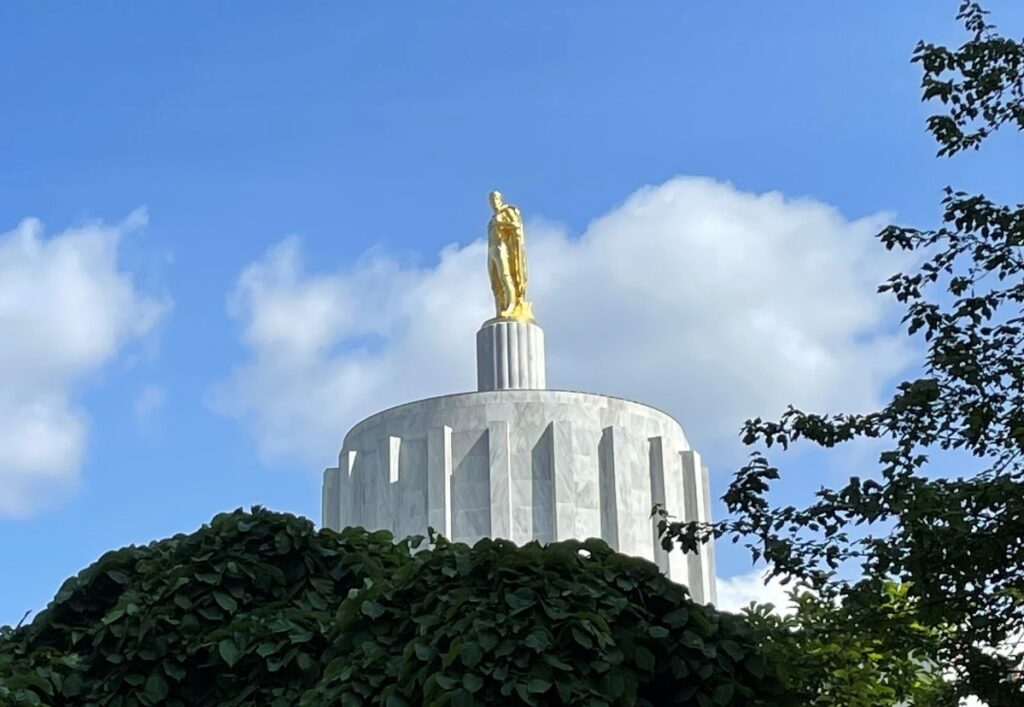
The Oregon Legislature wrapped up its 2024 legislative session in March. Trout Unlimited (TU) and Wild Steelheaders United are pleased to report that the Legislature passed some important policy and budget measures for fish and rivers this year. Fortunately, some counter-productive proposals didn’t advance.
Monsanto Settlement Fund
This session, the Legislature established a massive grants program to fund significant natural resource restoration in Oregon for at least the next 50 years.
In December 2022, the State of Oregon settled a case with certain Monsanto companies about alleged PCB contamination for $698 million. Monsanto has already paid, and the account kicks out approximately $80,000 daily in interest. Senate Bill 1561 created an initial 50-year state fund and oversight framework to allocate the approximate $30 million in interest generated annually by the fund towards various natural resource restoration efforts. The new funding source will be additive to existing funding programs and thereby intended to fund additional, new levels of conservation and restoration work rather than simply replacing the funding source for existing programs.
Under the settlement agreement, Oregon agreed to use the settlement funds for a broad scope of work that included cleanup of polluted sites, remediating impaired waterbodies, protecting wildlife habitat, and enhancing environmental quality. However, the original version of the bill implementing the agreement described a narrower scope of work eligible for funding under the settlement—primarily relating to characterization and remediation of polluted sites only. TU testified about that disconnect in the Senate, advocating to expand the language about the settlement fund’s purpose for consistency with the settlement agreement.
The Senate amended the bill for consistency with the settlement, and the final legislation addressed TU’s concerns. Wild Steelheaders is excited about the tremendous work that this fund will do for ensuring healthy habitats for fish, wildlife, and people in Oregon.
Budget Requests: Klamath Fish Reintroduction Team Funded
Agency biennial budgets are crafted in odd-year long sessions, but there are always budget matters to address in short sessions (e.g., agency budget clean-up, corrections, emergencies, pressing issues that cannot wait a year, etc.).
In 2024, Trout Unlimited led an effort to secure funding for ODFW’s Klamath fish reintroduction team, which is charged with implementing the reintroduction plan for salmon and steelhead to the upper Klamath River basin. The Legislature heard our call, and as reported in this Wild Steelheaders blog post, added one full-time, permanent staff fisheries biologist and a couple seasonal fisheries technicians to the team starting this year. As a result of our efforts, the largest dam removal and river reconnection project in history will have a team of 4 people—not just 1 person—monitoring the first return of fish just after the remaining dams are removed this year.
Looking ahead to the 2025-2027 biennium’s budget, it is essential that Oregon fully invests in fish reintroduction and adequate monitoring on the Klamath restoration. TU will continue to advocate for this crucial work by the agency.
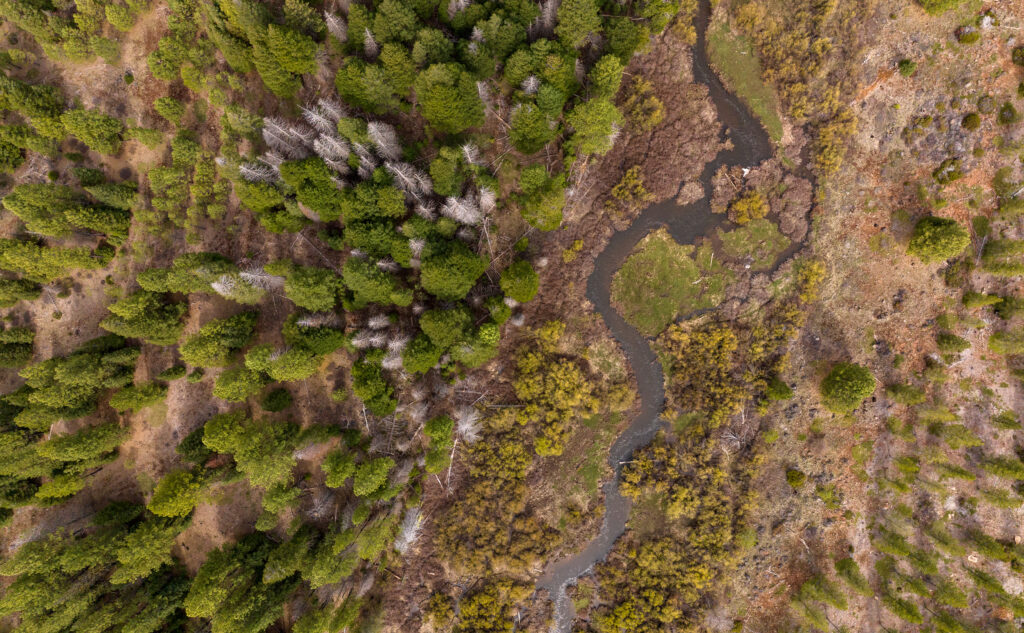
Willamette Wake Boats
In 2024, the Legislature also opted not to change recreational boating laws that are intended to protect wild salmon and steelhead in the Willamette basin.
The Oregon legislature has considered numerous bills over the past six years regarding the negative effects of large recreational wake sport motorboats in the Willamette River upstream of Willamette Falls. Wild Steelheaders engages in the issue because we’re concerned about how certain boating activities affect ESA-listed winter steelhead and Spring Chinook. (For example, by disrupting habitat and water quality as the outmigration of juvenile Chinook peaks in June.)
In 2022, the legislature landed upon an enforceable framework that prohibited wake-surfing in a specific section of river vulnerable to resource damage, and restricted boats larger than 5,500 pounds from engaging in towed watersports in certain areas. (Read about our engagement on SB 1589 in the 2022 session here.)
Senate Bill 1590 would have rescinded all the “towed watersports” statutes, effectively rolling-back the 2022 law and reopening the Willamette upstream of Willamette Falls to wake-surfing and towed watersports by boats of any size. Less than 24 hours before the bill’s public hearing, its sponsor introduced an amendment that would have kept the laws on the books but gut the specifics by allowing wake surfing again and applying a maximum boat weight limit of 10,000 pounds (which would apply to very few boats in Oregon).
TU opposed SB 1590. All four TU chapters in the Willamette Valley—and the state-level grassroots Oregon Council of Trout Unlimited—submitted written testimony opposing the bill due to concerns about its effect on various Willamette basin fish runs. The Senate also heard testimony from private landowners that experienced dock damage and bank erosion before the current law was in effect, folks concerned about water quality, recreational users that prefer not to engage in towed watersports, and of course, the wake boat community itself.
On February 13th, the Senate Natural Resources and Wildfire Committee killed the bill by opting not to move it out of committee this session. Wild Steelheaders applauds that result, though we expect another version of this bill to return in future sessions. We’ll continue to advocate for the best interests of native fish and water quality if and when it does.
Bi-State Management of Walla Walla River
The Legislature also enacted a bill regarding bi-state management of water resources in the Walla Walla River, which will help steelhead and other native fish by legally protecting water instream per flow restoration projects in Oregon across the Washington state line.
SB 1567 directs the Oregon Water Resources Department (OWRD) to take certain actions in implementing the collaborative Walla Walla Water 2050 Strategic Plan.
Native fish species in the Walla Walla River, including summer steelhead, migrate across state lines. At different points in their life cycles, those fish may inhabit Oregon or Washington portions of the watershed.
The unique geography and fishery management issues in the Walla Walla River raise the need for bi-state management of this river, unlike most other streams in Oregon. One ongoing issue in the watershed regards instream flow restoration, such as instream leases, and how that water may be legally protected across state lines. The Washington legislature enacted a companion bill last year, and the Confederated Tribes of the Umatilla Indian Reservation strongly supported the legislation in both states.
TU supported SB 1567—as well its predecessor that did not make it through the 2023 Oregon legislative session — and Wild Steelheaders expect one outcome to be the ability to legally protect water instream across state lines, to the benefit of native fish and water quality.
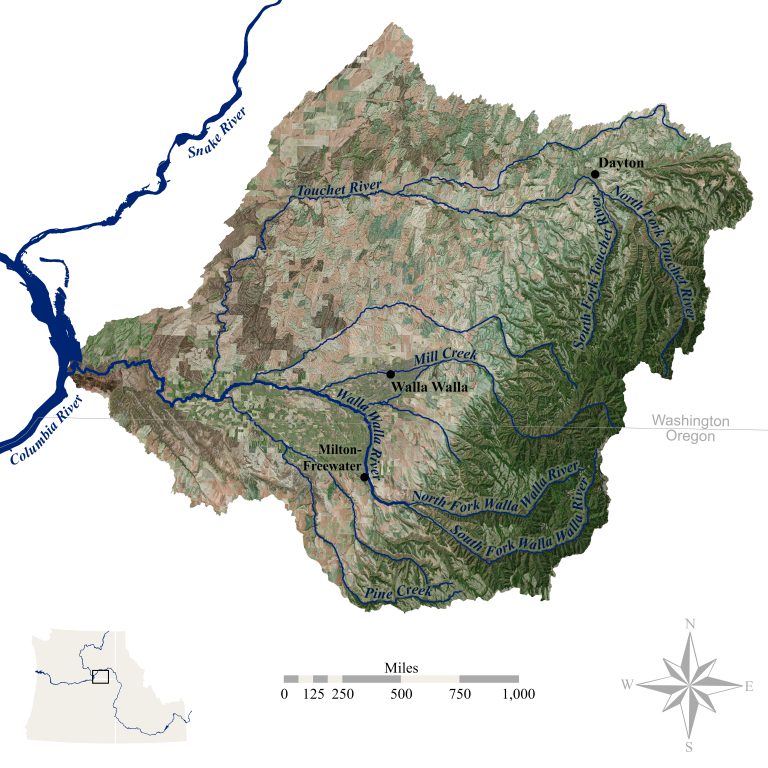
Columbia Commercial Gillnets
The Legislature also directed Oregon Department of Fish and Wildlife (ODFW) to immediately end its program for issuing new commercial, non-tribal gillnet licenses in the Columbia Basin, and to convene a workgroup in 2024 related to a buyback of remaining permits.
In Oregon, non-tribal commercial gillnetters must have a permit issued by the state. Two years ago, the Washington legislature budgeted almost $15 million for a gillnet buyback, and purchased the majority of Washington permits. Next year, Oregon’s Columbia River Basin Endorsement (CRBE), which funds various Columbia fisheries programs, will be up for renewal by the legislature (following the 4-year extension of statutory authority for the CRBE from 2022 to 2026, per SB 59 (2021)). At that point, the legislature could address any policy recommendations of the work group at the same time as any legislation on the CRBE.
Senate Bill 1509 directs ODFW to convene a work group of at least six members to consider how an Oregon commercial gillnet buyback program can best complement Washington’s buyback program and make recommendations on specifics of an Oregon buyback and any changes to laws, rules, or funding levels necessary to implement that Oregon buyback.
Wild Steelheaders sees merit in reforming non-tribal commercial gillnet fisheries to reduce impacts to ESA-listed and wild fish. Our primary interest in related policy (in both Oregon and Washington) is ensuring that any such adjustments to the commercial fishery have conservation benefits that result in more wild fish escaping harvest in the river’s mainstem and being allowed to successfully reach spawning grounds.
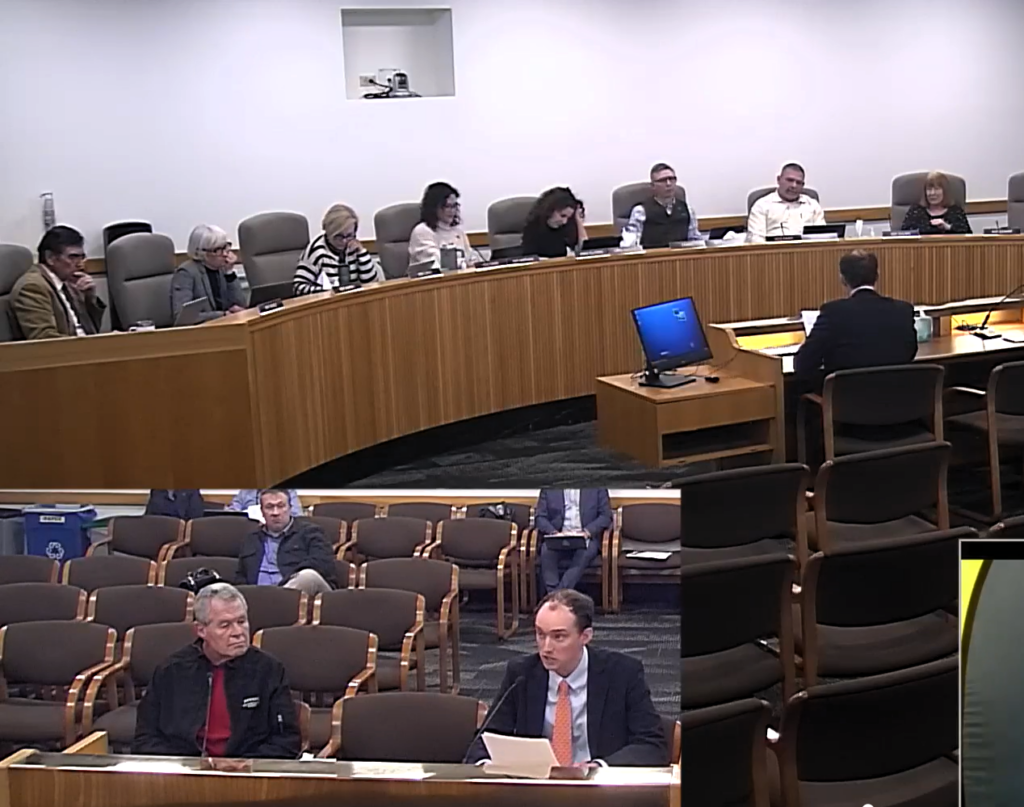
Beaver Coexistence Fund
The Legislature considered establishing a grants program to ease conflict between beavers and private landowners, but the bill did not pass.
Wild steelhead and other native fish thrive in the habitat—and instream flow conditions—created by beavers. House Bill 4014 would have established a “Landowners Living with Beavers Grant Program” housed within the Oregon Department of Fish & Wildlife and appropriate $1.5 million to implement it. Last year, the legislature enacted HB 3464, which consolidated all state agency jurisdiction for beaver issues in ODFW, with support from the Oregon Council of TU.
This year’s bill would build upon last year’s policy change by making more tools available to landowners (e.g., tree-wrapping materials, pond levelers that prevent infrastructure damage at road/stream crossings, technical support for addressing agricultural damage from beavers), thereby avoiding conflict and allowing more beavers to provide ecological benefits to Oregon fish, wildlife, and water resources. The Oregon Council of TU supported the 2024 bill.
Wildlife Omnibus & Invasive Species Funding
The Legislature funded several invasive species programs in 2024.
House Bill 4148 was a wildlife omnibus package with several components geared towards improving conditions on the landscape for native wildlife species and combating non-native, invasive species. Of particular note for wild steelhead, the bill would have allocated $1.5 million to the Oregon Invasive Species Council to mitigate and respond to invasive species concerns in Oregon (such as zebra or quagga mussels, and emerald ash borer, which was recently discovered in Oregon and will likely devastate riparian tree cover in coming decades). A very broad coalition of NGOs supports the bill, including the Oregon Council of TU.
Ultimately, HB 4148 died, but the end-of-session omnibus bill SB 5701 carried forward some of the components relevant to fisheries conservation, including $1 million to Oregon’s Invasive Species Council for “invasive species outreach and education” and “activities to mitigate the negative impacts of invasive species,” and $795,000 to ODFW for detecting wildlife diseases.
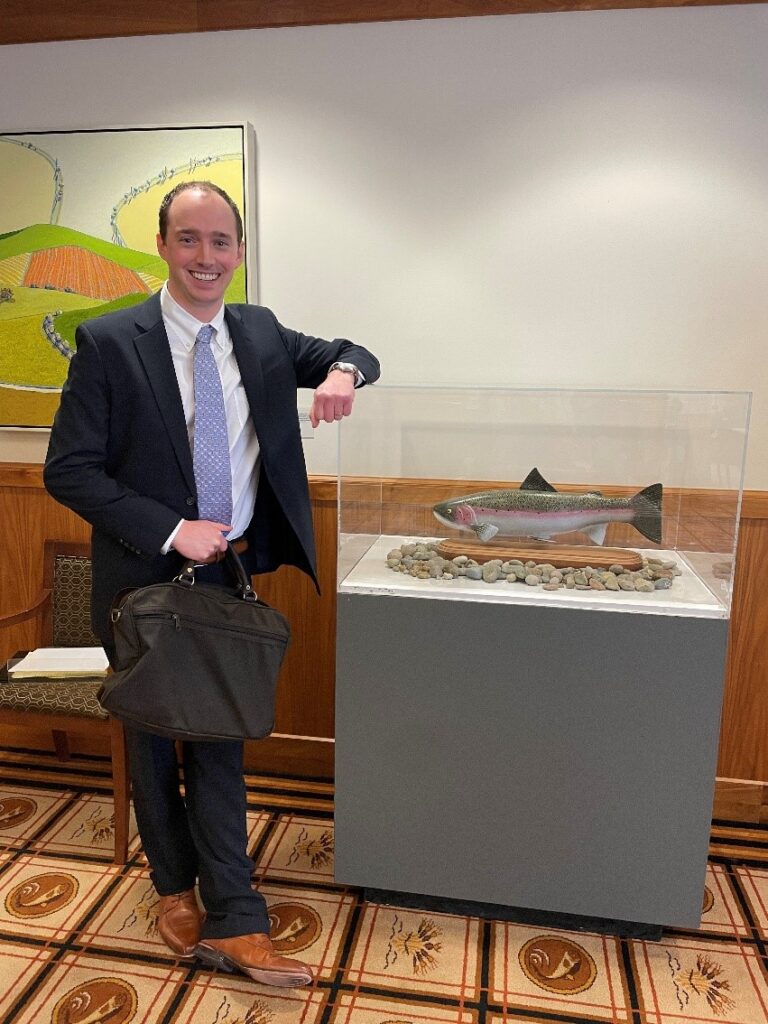
Summary
The policy and budget achievements of the 2024 legislative session will benefit wild steelhead and rivers in Oregon for years to come. In 2025, the Oregon legislature will hold another “long session” likely to contend with significant water and natural resources issues; TU will be present and we encourage you to reach out to us with questions or if you’re interested in supporting our efforts.
James Fraser is Trout Unlimited’s Oregon Policy Director and can be reached at james.fraser@tu.org.
